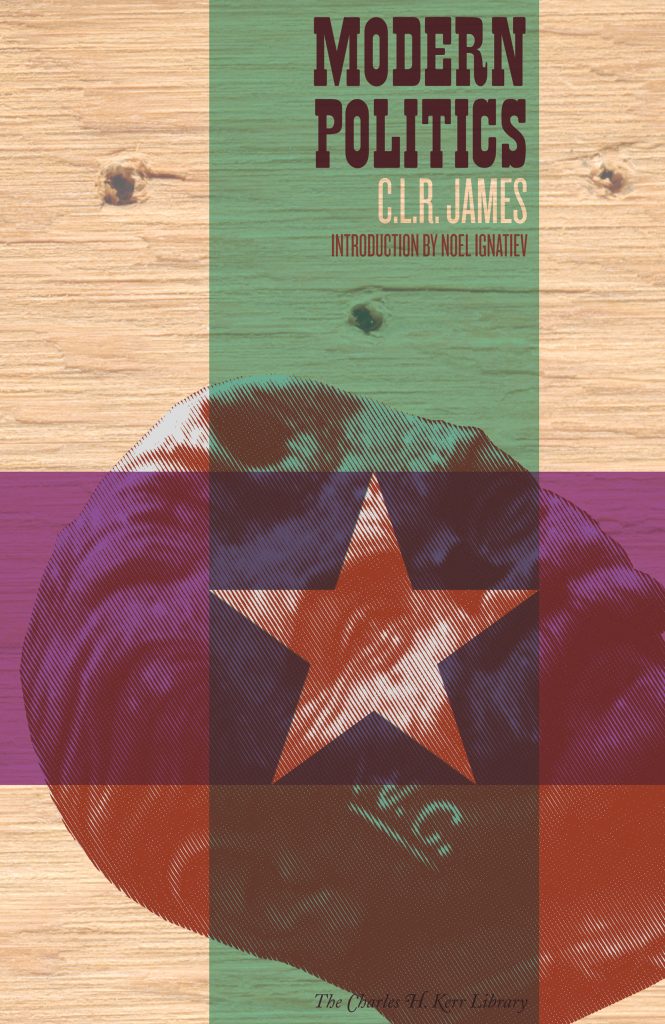By Michael Lazarus
Marx and Philosophy
September 2nd, 2015
In the Preface to his 1938 book Black Jacobins, C.L.R James writes of the contemporary state of world affairs: ‘It was in the stillness of a seaside suburb that could be heard most clearly and insistently the bombing of Franco’s heavy artillery, the rattle of Stalin’s firing squads and the fierce shrill turmoil of the revolutionary movement striving for clarity and influence. Such is our age and this is of it, with something of the fervour and the fret.’ (James 1963, xi) Much of this remains true for James in 1960. But now it is the menacing rumble of Stalinist tanks rolling through the streets of Budapest that punctuates Modern Politics. For James, the revolutionary movement that saw the establishment of the workers councils in Hungary in 1956 embodies the essence of the modern world.
Modern Politics is the publication of a lecture series James gave at the Adult Education Centre in his native Bay of Spain, Trinidad throughout August 1960. At the outset James makes clear his aim is not to propagandize, but rather to introduce the attendees to the problems of contemporary politics. This is done through the prism of the history of Western political thought, underscoring the centrality of Marxism as both a historical and philosophical project. James’ tone in these speeches is markedly more restrained than his lyrical historical writings (Black Jacobins being the most remarkable). While popular and introductory, Modern Politics sheds significant light on the theoretical underpinnings of James’ Marxism. Simultaneously, its republication challenges the arid academic view of James as just another cultural critic. Although the interest in James’ work has been relatively constant since the 1980s, this book is a strong reminder of his importance and his dynamism as a Marxist thinker and a reaffirmation of the breadth and effortlessness of his oratory.
The lectures were given by James in the immediate period before his resignation from editorship of the Trinidad People’s National Movement’s organ The Nation. The betrayals of the P.N.M. had seen the pro-independence party move considerably to the right and James came into conflict with his old co-thinker turned political foe, Eric Williams, now Premier. James was a popular figure at this time and Trinidadian politics was at boiling point; the transition from colonialism to independence was in its most crucial stages. And after twenty-six years abroad James returns to Trinidad. It comes as no surprise that the halls were filled for this event. However, the initial publication was suppressed and only released in 1973. Its reissue has been long overdue. Regrettably the new introduction by Noel Ignatiev, is overly workerist and oddly misses the opportunity to discuss much of this crucial (and fascinating) contextual detail. Instead, Ignatiev leaves the original 1973 Introduction by Martin Glaberman to sketch the context in just one page and prefers to spend considerable time explaining his own experiences as a militant worker. This seems a pity.
These lectures, delivered in a popular style (like that of Marx’s Labour, Prices and Profits) were designed for an audience largely unfamiliar with Marxist jargon and untrained in the technical language of specialists. Still, the characteristic profundity of James is present throughout these lectures. Like any great popularizer, James does not bastardise his argument in the name of simplification but introduces a nuanced perspective, aimed at adding political clarity and comprehensibility. To achieve this and at the same time provide a deeper elaboration of philosophical insights has always been the test of the socialist intellectual.
To give a sense of how James attempts this, it is worthwhile first offering an overview of the content of the lectures.
In Lecture I, we learn of the remarkable virtues of the ancient city-state: the legacy of direct democracy, the unity of the individual and society, and the establishment of the fields of human thought established by the Greeks and still pertinent today. From here we are taken from Rome to the Renaissance city to Cromwell and the Levellers, culminating in the Enlightenment and Rousseau. The second lecture judges the inheritance of Hegel and Marx to the Enlightenment, tracing the development of Marxism, through 1848, the Paris Commune, the betrayal of the Second International to the banner of the Third International and October 1917. Lecture III outlines the importance of the form of the Soviets and covers the period between the wars, including comments on those twins of totalitarianism Fascism and Stalinism. To understand one, you must understand the other. (In an appendix, James speaks very favourably of Hannah Arendt’s Origins of Totalitarianism (157). While Arendt was also a keen supporter of the Hungarian Revolution, James is well aware she might have preferred the workers councils without the workers.) The fourth lecture concerns World War II and the operations of the modern market, here he ties his analysis of politics to Marx’s labour theory of value. In Lecture V James critiques the compromises of the welfare state and deals with the exploitation of sex, class and race. And finally in the last lecture, advancing from a discussion of the great modern artists, James brings the disparate themes together to suggest the only way out of our current predicament is the movement of the masses and the establishment of a new form of class rule.
The narrative of the lectures is framed by the central questions of political theory; his starting point, the great achievement of Classical Athenian democracy, is used to advance his conception of history and political thought. Here the ‘good life’ is first elaborated, tied intrinsically to the organisation of society that allows for the active political life to be realised.
The historical (and slightly idealised), example of Athens provides an example of the possibilities of direct democracy that is the yardstick that is used to connect democracy, ancient and modern. A ‘return’ to the polis, in this conception, can only be achieved with the total democracy of worker’s councils.
James takes up, perhaps unexpectedly, Aristotle and Rousseau to make this case. He insists that ‘you should always have with you’, The Politics and The Social Contract on top of the Marxist classics like State and Revolution and Capital (155, cf. 32). In Aristotle, we find the individual defined in relation to society. To be human is to be a polis-dweller. This conception of society before the individual, the whole defining the part, is taken up crucially by Marx.
Rousseau returns the question back into political thought, ‘seeking a form of political organisation in which the individual will feel himself in relation to a government in much the same way that the Greek citizen felt in relation to the city-state’ (34). Rejecting representative democracy and the Age of Reason, Rousseau’s social contract is between people to form a society, and when a government refuses to do what is satisfactory, the ‘general will’ is broken. James sees in this doctrine ‘profound revolutionary implications’ (33). James’ usage of these two thinkers, interestingly, is a forerunner to the debates over the philosophical foundations of Marx that became a staple of the scholarship by the early 1970s.
The bourgeois and industrial revolutions frame James’ discussion of the history of philosophy that precedes Marx. Descartes, Locke, Berkeley, Hume are touched upon before more substantial engagement with Kant and Hegel. The theoretical developments are centred around the relation between intellect and experience. James’ Hegelianism is evident, in his (albeit brief) discussion of the master. It was of course, Hegel who ‘brought philosophy to an end’, coming to a point that ‘if he had of gone on, he would have been compelled to say that the only solution to these problems was the proletariat establishing a new regime and laying the basis of human equality’ (43). In this discussion, the relationship that Marxism has to the Enlightenment is opened up. James suggests that Marx could claim to be both the heir and solution ‘to the finest currents of thought and action of five hundred years of European history’ (44). This background of inheritance and rupture is embodied in the composition and the tone of the lectures; a sophisticated philosophical theme laid out in an introductory way.
Further, after outlining the development of philosophy, James can more fully furnish the other legacy of the French Revolution, the birth of the workers movement. ‘The new doctrine of Marx was not the doctrine of the age of the men of Reason; it was not the doctrine of Rousseau either. It sprang from the socialism which evolved at the last stage of the French revolution’ (44). James can now deal fluidly with a history of 1848 onwards, which to him is a battle between the defenders of capitalism and the proponents of Marxism (56-7).
Repeatedly, James emphasises the inherent capacity of workers to make their own history. In the form of the worker’s councils, he completes his Aristotelian insistence that the ‘the good life’, is the one to which workers strive. It signals ‘the end of the capitalist mode of production’, the ‘vindication of our theory and a guarantee of a high destiny for the great mass of mankind’ (146). The significance of the events of Hungary in 1956 are repetitively used to demonstrate James’ unequivocal belief in workers councils as ‘the ultimate form of modern political development’ (98).
James is able to remain faithful to ‘socialism from below’ due to his rejection of Stalinism and his uncompromising internationalism. Linking the triumph of Nazism with the tragic failure of the German Revolution in 1923, James shows ‘there is no history of any single country anymore’ (66). From this defeat and through the savage rise of the bureaucracy, Stalin presided over the ‘destruction of the Leninist Bolshevik Party’ (67). What form of state the USSR was became a key question for socialists. Trotsky and the mainstay of Trotskyism saw the USSR as some form of a ‘workers state’, whereas James and the Forrest-Johnson Tendency, argued that the USSR was actually ‘state capitalist’ (73). This was a seriously minority position, held previously by few. However, this analysis led James to relatively drastic anti-party conclusions (despite Trotsky remaining a key figure in his politics). This hostility is reflected in his abandonment of the dialectical necessity of the party as the mediator between revolutionary theory and practice. James places an over-emphasis on spontaneity rather than seeing the two-sided relation spontaneity has with organization (58, 97-100).
Modern Politics is a quality introduction to Marxism by a major theorist. Although clearly not a work of academic scholarship, James’ heavily textured approach to Marxism and its social context is refined and enjoyable. This task is seldom accomplished well but James, with the elegant turn of phrase and clarity that is so characteristic of his style, manages. What is most clear throughout these lectures is the importance of looking at the movement of history as the insatiable desire for human agency within the structures that define the possibilities of action. The conclusion: the self-activity of the working-class to make their own history is the hope of modern politics.







